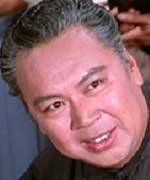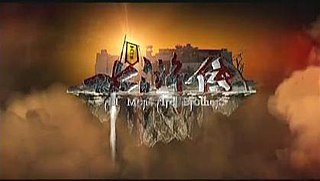
Lo Wei was a Hong Kong film director and film actor best known for launching the martial arts film careers of both Bruce Lee, in The Big Boss and Fist of Fury, and Jackie Chan, in New Fist of Fury.

The Emperor in Han Dynasty, also released under the title The Emperor Han Wu in some countries, is a 2005 Chinese historical drama television series based on the life of Emperor Wu of the Han dynasty. It uses the historical texts Records of the Grand Historian and Book of Han as its source material.

Romance of the Three Kingdoms is a Chinese television series adapted from the classical 14th century novel of the same title by Luo Guanzhong. The series was produced by China Central Television (CCTV) and was first aired on the network in 1994. It spanned a total of 84 episodes, each approximately 45 minutes long. One of the most expensive television series produced at the time, the project cost 170 million yuan. It was completed over four years and involved over 400,000 cast and crew members, including divisions of the People's Liberation Army from the Beijing, Nanjing and Chengdu military regions. Some of the dialogue spoken by characters was adapted directly from the novel. Extensive battle scenes, such as the battles of Guandu, Red Cliffs and Xiaoting, were also live-acted.

Three Kingdoms is a 2010 Chinese television series based on the events in the late Eastern Han dynasty and the Three Kingdoms period. The plot is adapted from the 14th century historical novel Romance of the Three Kingdoms and other stories about the Three Kingdoms period. Directed by Gao Xixi, the series had a budget of over 160 million RMB and took five years of pre-production work. Shooting of the series commenced in October 2008, and it was released in China in May 2010.
Wei Ping-ao, also known as Paul Wei, was a Hong Kong-based Chinese actor who started his career in the Shaw Brothers Studio. He is best known for playing cunning interpreters in Bruce Lee's 1972 films Fist of Fury and Way of the Dragon, in which he dubbed his own voice, and also appeared in films such as Deaf Mute Heroine (1971), Hapkido (1972) and Fists of Bruce Lee (1978). He suffered from jaundice in his later years. He died on 3 December 1989 in British Hong Kong.

The Story of Han Dynasty is a Chinese television series based on the events in the Chu–Han Contention, an interregnum between the fall of the Qin dynasty and the founding of the Han dynasty in Chinese history. The series was first broadcast on CCTV in China in 2003. Directed by Wei Handao, the series starred Hu Jun, Xiao Rongsheng, Jacklyn Wu, Kristy Yang, Wang Gang and Li Li-chun.

The Water Margin is a 1998 Chinese television series adapted from Shi Nai'an's classical 14th-century novel of the same title. It was produced by CCTV with Zhang Jizhong as producer. It was first broadcast in China in January 1998. The series also featured action choreography by Yuen Woo-ping.

All Men Are Brothers is a 2011 Chinese television series adapted from Shi Nai'an's 14th century novel Water Margin, one of the Four Great Classical Novels of Chinese literature. The series is directed by Kuk Kwok-leung and features cast members from mainland China, Taiwan and Hong Kong. The series was first broadcast on 8TV in March 2011 in Malaysia.

The Rebirth of a King, also known as Yue Wang Gou Jian, is a Chinese television series based on the life of King Goujian in the state of Yue in the Spring and Autumn period. Directed by Huang Jianzhong, Yuen Bun and Yanyi, the series starred Chen Baoguo, Bao Guo'an, You Yong, Li Guangjie and Zhou Yang. The series was first aired on TVB in November 2006 in Hong Kong and a year later on CCTV in mainland China.

The Patriot Yue Fei is a 2013 Chinese television series based on the life of Yue Fei, a Song dynasty general widely regarded as a patriot and national hero in Chinese culture for his role in defending the Song empire against the Jurchen campaigns. While the plot is based on historical sources and descendants of the general served as consultants, it also includes elements of fiction and draws ideas from the novel General Yue Fei (說岳全傳) and other folktales on his life.

Justice Bao is a Chinese TV series starring producer Jin Chao-chun as the Song dynasty official Bao Zheng. The series ran for 3 seasons from 2010 to 2012. In addition to Jin, Kenny Ho, Fan Hung-hsuan and Lung Lung again reprise their iconic roles from the 1993 Taiwanese hit Justice Pao and the 2008 Chinese series Justice Bao.

Tang Ming Huang is a Chinese television series based on historical events in the reign of Emperor Xuanzong of the Tang dynasty. The series was directed by Chen Jialin and starred Liu Wei as the eponymous emperor. It was first broadcast on CCTV-1 in 1990 in mainland China.

Wu Zi Bei Ge, also known as Wu Zi Bei Ge: Wu Zetian Zhuan, is a 2006 Chinese television series based on the life of Wu Zetian, the only woman in Chinese history to assume the title of "Empress Regnant". The series was directed and written by Chen Yanmin, and starred Siqin Gaowa and Wen Zhengrong as the empress. The series' title Wu Zi Bei Ge literally means "Song of the Uncharactered Stele", with the "stele" referring to the unmarked one standing near Wu Zetian's tomb at the Qianling Mausoleum.

Swordsman is a 2013 Chinese television series adapted from Louis Cha's novel The Smiling, Proud Wanderer. The series is written and produced by Yu Zheng, and stars Wallace Huo, Joe Chen, Yuan Shanshan, Chen Xiao and Yang Rong. Shooting started on 24 March 2012 in Xiandu, Jinyun County, Lishui, Zhejiang. It was first aired in China on Hunan Television from 6 February to 4 March 2013. The plot deviates significantly from the novel, with Dongfang Bubai depicted as a woman and having a romantic affair with Linghu Chong.

Cao Cao is a Chinese television series based on the life of Cao Cao, a warlord who rose to power towards the end of the Eastern Han dynasty and laid the foundation for the state of Cao Wei in the Three Kingdoms period. Directed by Hu Mei, the series aimed to portray a more historically accurate image of Cao Cao, who is traditionally depicted as a villain in Chinese culture. Starring Zhao Lixin as the eponymous character, the series was filmed at the Xiangshan Film City in Ningbo, Zhejiang between 1 November 2011 and 15 March 2012.
The China Badminton Super League (CBSL) (Chinese: 中国羽毛球俱乐部超级联赛) is the prime National team competition for badminton players in China. The China Badminton Super League was re-launched in 2009 after a failing attempt seven years earlier. Liu Fengyan, director of the Table Tennis and Badminton Administration Center under China's State General Administration of Sport, announced the re-launch during the 50th anniversary meeting of the Chinese Badminton Association.

The Advisors Alliance is a 2017 Chinese two-part television series based on the life of Sima Yi, a government official and military general who lived in the late Eastern Han dynasty and Three Kingdoms period of China. The series starred Wu Xiubo as the main character, with Liu Tao, Li Chen, Janine Chang, Tang Yixin, Yu Hewei and Wang Luoyong playing supporting roles. The first part of the series started airing on Jiangsu TV and Anhui TV on 22 June 2017. The second part started airing on Youku on 8 December 2017.
The Sound of Happiness is a Taiwanese Hokkien television drama that began airing on SET Taiwan in Taiwan on 26 December 2018, from Mondays to Fridays, and ended its broadcast on 5 August 2020. The series started production on 22 November 2018. The series is aired every weeknight at 8pm and is simulcast one hour later on SET Taiwan's sister channel, SET Drama.














